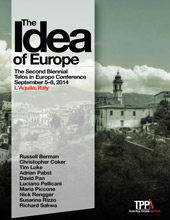In today’s episode of the Telos Press Podcast, Camelia Raghinaru talks with David Pan about his article “State, Movement, People: Representation and Race in the Construction of Political Identity,” from Telos 189 (Winter 2019). An excerpt of the article appears here. If your university has an online subscription to Telos, you can read the full article at the Telos Online website. For non-subscribers, learn how your university can begin a subscription to Telos at our library recommendation page. Purchase a print copy of Telos 189 in our online store.
|
In today’s episode of the Telos Press Podcast, Camelia Raghinaru talks with Mark G. E. Kelly about his article “Foucault and the Politics of Language Today,” from Telos 191 (Summer 2020). An excerpt of the article appears here. If your university has an online subscription to Telos, you can read the full article at the Telos Online website. For non-subscribers, learn how your university can begin a subscription to Telos at our library recommendation page. Purchase a print copy of Telos 191 in our online store. Hyeryung Hwang’s “Deleuze, Affect Theory, and the Future of Realism” appears in Telos 181 (Winter 2017). Read the full article at the Telos Online website, or purchase a print copy of the issue in our online store. Individual subscriptions to Telos are now available in both print and online formats. In this essay, I critically address the current prominence of affect theory and its close affiliation with the aesthetic absolute of high modernism. In doing so, I demonstrate how affect theory, which has been significantly influenced by Gilles Deleuze, relays a restrictive recognition of the functions of consciousness, representation, and agency as rigid codification, despotic power, and authoritative unity. Certain issues arise when affect theory registers itself as a promising and effective political theory, and I address these issues by investigating Deleuze’s discussion of affect in his various texts on aesthetics and politics. |
||||
|
Telos Press Publishing · PO Box 811 · Candor, NY 13743 · Phone: 212-228-6479 Privacy Policy · Data Protection Copyright © 2024 Telos Press Publishing · All Rights Reserved |
||||
 I opened this conference by referring to the medical metaphor within which we have framed the question of democracy in order to point toward two paths for understanding this metaphor and to plead for the practice of both medicine and politics, not as mechanical sciences but as healing arts. In the following paper I would like to provide an example of the kind of artistic practice I have in mind by looking at two case histories of revolutionary movements from below, one success and one failure. What I would like to show in both cases is that the path to success lies in understanding the problem of democracy, first, as a problem of metaphor and thus of representation in the aesthetic sense and, second, as a problem that involves intervention in a developing metaphorical dynamic.
I opened this conference by referring to the medical metaphor within which we have framed the question of democracy in order to point toward two paths for understanding this metaphor and to plead for the practice of both medicine and politics, not as mechanical sciences but as healing arts. In the following paper I would like to provide an example of the kind of artistic practice I have in mind by looking at two case histories of revolutionary movements from below, one success and one failure. What I would like to show in both cases is that the path to success lies in understanding the problem of democracy, first, as a problem of metaphor and thus of representation in the aesthetic sense and, second, as a problem that involves intervention in a developing metaphorical dynamic. 






